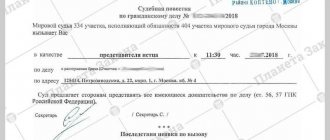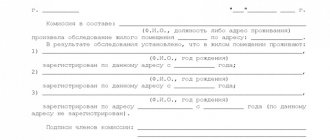It is extremely rare in modern judicial practice to find an application to establish the fact of birth. However, there is an opportunity to make such a statement to establish a fact of legal significance. And the method is used when the documents necessary for registering a birth are missing. For example, a child was born at home. And the careless parents did not receive the certificate on time. The child was born outside a medical organization, possibly in extreme situations (for example, on the road in a hard-to-reach area). That is, in cases where a medical organization cannot issue a birth document for the registry office.
The fact of the birth of a child is subject to state registration with the civil registry office. Without a birth certificate, neither a compulsory medical insurance policy nor an insurance certificate of state pension insurance will be issued. That is, the rights of the child will be almost impossible to realize. And try to prove who his parents are.
In general, a court decision to establish the fact of birth will be necessary to realize the rights of the child and his parents. Having received a refusal to register the birth of a child, you must use the example of an application to establish the fact of birth to go to court.
:
Application to establish the fact of birth
Registration facts
By way of special proceedings, the following facts characterizing the legal status may be established:
- fact of birth registration;
- fact of registration of adoption;
- fact of marriage registration;
- fact of registration of divorce;
- fact of death registration.
The above legally significant events, as a general rule, are registered by civil registry offices, which issue a certificate of state registration of a civil status act.
However, it may happen that documents confirming the fact of registration are not preserved either by the citizen or by the civil registry office.
How to establish the legal fact of birth
Before resorting to the help of the court in order to confirm the fact of the birth of a child, you need to request information from the medical institution where the person was born.
If the relevant information is not preserved there, the registry office will refuse to register and will not issue a birth certificate. In this case, only the court can help.
If the applicant is a minor, you should contact the Federal Migration Service commission to establish your identity. This way a person can document his last name, first name, patronymic and date of birth.
In addition, in this matter, the presence of witnesses is also useful so that they can confirm that the person is who he really is.
After all the necessary documents have been collected, you can submit an application to the court and confirm the legal fact of birth.
Grounds for applying to court to establish the fact of registration
As follows from the provisions of Part 2 of Art. 74 of the Federal Law “On Acts of Civil Status”, the basis for applying to the court to establish the fact of state registration of a civil status act is the absence of a primary or restored civil status record, including in the event of a refusal by the civil registry office to restore such a record.
In the case of the fact of registration of the above acts of civil status, the following circumstances must be established:
- the existence of the fact of registration;
- the fact of failure to maintain a corresponding record in the registry office, if the restoration of such a record by the registry office is refused or if the fact of registration of birth, adoption, marriage, divorce and death can be restored only on the basis of a court decision;
- the purpose of the appeal (what legal consequences will entail the establishment of the fact of registration);
- the presence or absence of a dispute about law.
Filing an application to court
Before going to court, you must contact the registry office and receive a written refusal to register the fact of birth. The notice is attached to the application to the court.
An application to establish the fact of birth of a child, as well as an application to register the fact of birth, is submitted to the district court at the place of residence of the applicant. When submitting an application, a state fee is paid.
| The current amount of state duty payment today: | |
| state fee to court |
Documents that can serve as evidence of the fact of birth or registration of birth are attached to the application. If necessary, you can identify witnesses who will confirm the applicant’s arguments.
From October 1, 2019, the applicant himself sends an application with attachments to interested parties
Until October 1, 2021, the plaintiff sent to the court copies of the statement of claim and appendices to it according to the number of defendants and third parties, and the court sent the received documents to all participants in the process named in the claim.
From October 1, 2021, the plaintiff must independently send to other participants in the process a copy of the claim and other documents attached to the claim, and provide confirmation of their sending to the court (clause 6 of Article 132 of the Code of Civil Procedure of the Russian Federation). This rule also applies in special proceedings: the applicant himself is obliged to send interested parties a copy of the application and its attachments.
Sample application to establish the fact of registration of birth, adoption, marriage, divorce, death (general form)
To court _______
Applicant: Full name, resident: __________, st. ___, sq. ___ phone: _____, email: ___
Interested person: ______ (name or full name) address: _____, telephone: ______, fax: ______, email address: ______
State duty 300 rubles
Application to establish the fact of registration of birth (adoption, marriage, divorce, death)
_____________________________ (the following circumstances are indicated: (when and with whom an event occurred that is a legal fact: born, formalized adoption, entered into marriage, divorced marriage, died).
_____________________________ (indicate: when and where the applicant applied to register a specific event).
_____________________________ (indicate for what purposes the applicant needs to establish the fact of registration of birth, adoption, marriage, divorce or death).
_____________________________ (indicate the reasons for the applicant’s impossibility of obtaining the appropriate documents or the impossibility of restoring lost documents with evidence (documents, acts, letters of a business or personal nature containing information about the registration of birth, adoption, marriage, divorce or death).
In accordance with clause 3, part 2, article 264 of the Code of Civil Procedure of the Russian Federation, the court considers cases to establish the fact of registration of birth, adoption, marriage, divorce, death.
Based on the above and in accordance with Articles 264 - 267 of the Code of Civil Procedure of the Russian Federation,
I ask the court:
1. Establish the fact of registration of birth (adoption), marriage, divorce or death) ___________ (indicate full name) "__"_______ __ city __________ (indicate the name of the body that carried out the registration).
2. To confirm the fact of registration of birth, adoption, marriage, divorce or death, I ask you to call and question witnesses: ___________________ (full name and addresses of witnesses)
Applications:
1. Documents confirming the fact that there is no record in the territorial civil registry office establishing the fact of registration of birth (adoption, marriage, divorce, death).
2. A copy of the application to the territorial civil registry office for the restoration of the record of establishing the fact of registration of birth (adoption, marriage, divorce, death).
3. Documents confirming the refusal of the territorial civil registry office to restore the record of establishing the fact of registration of birth (adoption, marriage, divorce, death).
4. Notice of delivery or other documents confirming the sending to the interested person of copies of the application and documents attached to it that he does not have.
5. A document confirming payment of the state duty.
6. Power of attorney of the representative from “__”________ ___ N ___ (if the application is signed by the applicant’s representative).
7. Other documents confirming the circumstances on which the applicant bases his claims.
“__”________ ___ Applicant (representative): __________/ Signature ___________/ (Full name)
Establish the fact of birth and obtain a birth certificate
Echoes of the chaos and uncertainty of the 90s. can still be found today. In just less than two years of my work, I came across three cases where citizens aged 16 to 20 did not have a birth certificate and, as a result, did not have a passport. True, I only had to work on one of them.
At the end of 2021, citizen K. approached me with a question about the need to issue a birth certificate for his sixteen-year-old son E., since E. had never had such a document.
Background.
Until 2001, he was in a civil marriage with a woman. In such cohabitation they had a son. They lived at that moment in Georgia, in a village where, according to him, there was no normal medical care, so the child was born at home, subsequently they did not go to the hospital, the fact of birth was not registered anywhere. By 2001, relations with his common-law wife went wrong, K. took his son and left for Russia. Here they live to this day. Just wherever you go, everywhere they ask for documents for the child, but they are not there. You can’t even buy a ticket for an intercity bus (to another region). To get a birth certificate, we went to local authorities: the registry office, the Ministry of Justice and others. Where it was explained to them that in their case a birth certificate would not be issued to them so easily, since there were no records of the child’s birth, so it was necessary, first, to establish the fact of his birth, and this was done through the court.
To prepare an application to the court and represent his interests in court, K. turned to me.
Working on a question.
At the initial stage, they already had some documents: answers from the local and regional registry office that there was no information about E.’s birth, a response from the Ministry of Justice and the Georgian registry office that there was no data there either.
Having thought about the background and documents, having become familiar with the existing practice, it became clear that on the one hand the matter is very simple - we need to establish the fact of birth: there is a father, there is a son, there are witnesses who will show and tell everything, there are documents about the absence of information that interests us; on the other hand, there was one nuance: in such cases, usually, either an adult who does not have a document applies, or, if it is a child, his mother. It's the mother. That is, a woman appears in court and says that she, then, there, gave birth to this child - the court does not doubt this and establishes the fact of birth. Our mother was absent, all contacts with her were lost, I have not seen a similar practice where only the father would apply to establish the fact of birth. From which I assumed that some difficulties would arise.
The justification for the requirements was as follows:
In the absence of a document in the established form on birth, state registration of the birth of a child who has reached the age of one year or more is carried out on the basis of a court decision to establish the fact of birth.
To obtain E.'s birth certificate, a request was sent to the Ministry of Justice of Georgia, in response to which it was reported that there was no record of his birth.
An appeal to the civil registry office of the Russian Federation also did not give the desired result, since in order to register a birth and obtain a birth certificate, it is necessary either to contact the civil registry office within one month from the date of birth of the child, or to have previously issued birth documents, or to have previously entered birth records.
These conditions could not be met due to the fact that the established one-month deadline had been missed, birth documents had not been issued previously, and birth records had not been made by the civil registry office.
Thus, it was not possible to establish the fact of birth and obtain a birth certificate out of court.
The legislation of the Russian Federation allows for the establishment of the fact of the birth of a child by a given woman on the basis of witness testimony.
Having collected all this, an application was drawn up and submitted to the court on behalf of K. to establish the fact of the birth of the child.
Not so simple.
Meanwhile, the court had its own opinion - the application was left without movement. The court motivated this by the fact that the mother’s medical documents were not attached to the application ((!) that’s where we should have the medical documents of another person), and the application did not indicate the child’s mother as a party to the process.
By the way: information confirming the fact of pregnancy constitutes a medical secret and is provided without the consent of the person in respect of whom such information is requested, to persons specified by law, to whom the plaintiff did not belong (part 1, part 4 of article 13 of the Federal Law “On Health Protection”) citizens").
The application was corrected and the requirements for establishing paternity were added. They decided to request only medical documents through the court. The court was not satisfied with the corrections. Result: the application was returned to the applicant due to failure to eliminate the comments that served to leave it without progress.
In returning the application to establish the fact of birth, the court proceeded from the fact that the shortcomings indicated in the ruling on leaving the application without progress had not been eliminated. The ruling noted that the court's instructions were not carried out within the prescribed period. In particular, medical documents were not provided confirming the fact of pregnancy and childbirth in the mother of the child.
They filed a private complaint, indicating that the mere fact that copies of medical documents were not attached to the application cannot serve as a basis for recognizing the requirements set out in the determination as not fulfilled and be a reason for returning the submitted application to the applicant.
Articles 131 and 132 of the Civil Procedure Code of the Russian Federation specify the requirements for the form and content of the statement of claim, as well as for the documents attached to the statement of claim.
According to paragraph 5 of Article 132 of the Civil Procedure Code of the Russian Federation, the following are attached to the statement of claim: documents confirming the circumstances on which the plaintiff bases his claims, copies of these documents for defendants and third parties, if they do not have copies.
Within the meaning of this norm of procedural law in its relationship with Articles 12, 56 and 147-153 of the Civil Procedure Code of the Russian Federation, the responsibilities for proving legally significant circumstances, including those specified in the statement of claim, are distributed by the judge between the parties after the application is accepted for court proceedings. In this case, evidence can be presented to the court by the parties both in preparing the case for trial and during the trial itself, with the exception of cases where federal law directly provides for the need to attach certain (named) documents to the application.
The regional court satisfied the complaint and sent the application to the court of first instance for acceptance.
“And on the road again!”
The application was accepted.
During the process, a petition was filed to obtain documents from Georgia about his mother’s pregnancy through court proceedings. Additionally, the court, on its own initiative, decided to find the child’s mother. The case was suspended for almost a year and a half...
And now, the long-awaited date for the court hearing has arrived. Along the way, they did a paternity examination, which confirmed that the plaintiff is E.’s father.
Having examined the evidence presented, interrogated witnesses, fortunately, the person who was present at the birth lives here, the court satisfied the stated requirements - paternity and the fact of birth were established.
Now all that remains is for the plaintiff to go to the registry office, write a statement there, and receive the long-awaited birth certificate of his son.
State duty amount
An application to establish the fact of the birth of a child by a specific woman is considered in court in special proceedings. The state duty in this case will be 300 rubles (clause 8, clause 1, article 333.19 of the Tax Code of the Russian Federation).
The application is submitted to the district court of general jurisdiction at the location of the applicant (Article 266 of the Code of Civil Procedure of the Russian Federation). The state fee must be paid specifically for the consideration of the case by this court, according to the relevant details (they can be found on the website of the desired court).
Expert opinion
Lawyer Alexander Vasiliev comments
If there is a dispute about maternity, the issue of establishing maternity is resolved through a lawsuit. Such a dispute is considered as non-property. It is subject to payment of a state duty of 300 rubles.
Establishment of legal facts for legal entities and individual entrepreneurs
The arbitration court, in accordance with the Arbitration Procedure Code (Article 218), establishes facts that have legal significance for the emergence, change or termination of the rights of legal entities and individual entrepreneurs in the field of business and other economic activities:
- the fact of ownership and use by a legal entity or individual entrepreneur of real estate as their own;
- the fact of state registration of a legal entity or individual entrepreneur at a certain time and in a certain place;
- the fact that a title document valid in the field of entrepreneurial and other economic activities belongs to a legal entity or individual entrepreneur, if the name of the legal entity, first name, patronymic or surname of the individual entrepreneur indicated in the document does not coincide with the name of the legal entity according to its constituent document, name, patronymic or surname of an individual entrepreneur according to his passport or birth certificate;
- other facts giving rise to legal consequences in the field of business and other economic activities.
A legal entity or individual entrepreneur has the right to apply to an arbitration court to establish facts of legal significance only if the applicant does not have the opportunity to obtain or restore the appropriate documents certifying these facts, and if a federal law or other regulatory legal act does not provide for another out-of-court procedure establishing relevant facts.
An application to establish facts of legal significance is submitted to the arbitration court at the location or place of residence of the applicant, with the exception of applications to establish facts of ownership, use and disposal of real estate and other facts of legal significance for the emergence, change or termination of rights to real estate property, which are submitted to the arbitration court at the location of the real estate.
The application must indicate the legal fact that needs to be established, as well as evidence confirming this fact. Such written evidence indicating the impossibility of obtaining the appropriate documents, or evidence indicating the impossibility of restoring lost documents, may be, for example, a document in which there is an error or inaccuracy, and a written refusal of the authority that issued this document to make appropriate corrections, etc.
If, when considering a case on establishing facts of legal significance, it turns out that a dispute about the law has arisen, the arbitration court leaves the application to establish facts of legal significance without consideration, and issues a ruling. The determination explains to the applicant and other interested parties their right to resolve the dispute through litigation.
The decision of the arbitration court to establish a fact of legal significance is the basis for registration of such a fact or registration of rights that arise in connection with the established fact by the relevant authorities and does not replace documents issued by these authorities.
Birth registration
Any person receives the first document (certificate) at a medical institution. Without it, the registry office will not issue a certificate. If there is no certificate or the newborn is abandoned, legally he does not exist, in reality he exists. As a result, it is impossible to acquire legal status.
To register a birth in the registry office, you need to provide:
- birth certificate provided by the institution where the birth took place;
- a certificate issued by the institution whose specialist assisted during childbirth (to whom the woman in labor later contacted);
- a certificate issued by an individual entrepreneur engaged in the provision of medical care without placement in a medical institution;
- statement from a person who was present at a birth that took place without the help of doctors outside a medical institution (among hermits, in a sect, without registering the mother, in
- extreme situation or remote location without access to medical care).
A person present at the birth can report this orally (in writing) to an employee of the registry office or MFC. If he cannot appear, the signature on the written application must be certified by the employer or educational institution, self-government body, or the head of the medical institution (if the witness is sick).
If none of these documents are available, a court decision is required for registration. Only on its basis will a certificate be issued.
Establishing the fact of the birth of a child in a special proceeding
The court will consider, in a special proceeding, an application to establish the fact of the birth of a child, if a document in the established form on the birth of a child is missing and it cannot be obtained in another manner or restored, and there is no dispute about the right (maternity) (clause 1, part 1, article 262 , part 3 of article 263, part 1, clause 10 of part 2 of article 264, article 265 of the Code of Civil Procedure of the Russian Federation
;
paragraphs 11, 12 of the resolution of the Plenum of the Supreme Court of the Russian Federation dated May 16, 2017 No. 16
;
appeal ruling of the Moscow City Court dated February 28, 2018 in case No. 33-8094/2018
).
Note! If, when filing an application or considering a case in a special proceeding, it is established that there is a dispute about the right, the application will be left without consideration. In this case, the dispute can be resolved through litigation (part 3 of article 263 of the Procedure of the Russian Federation
).
To establish the fact of the birth of a child in a special proceeding, we recommend following the following algorithm.
Drawing up an application
We can say that recognition of the fact of birth belongs to the category of the most difficult cases among special proceedings. Accordingly, the content of the application is difficult to draw up using standard templates.
Therefore, to draw up an application, it is better to contact a qualified lawyer. If such an appeal is impossible for certain reasons, then when compiling it yourself, we recommend using the standard template available on our website.
When specifying a standard template, the following recommendations should be taken into account:
- the birth of a person is a phenomenon in time and space, and therefore the application must contain the date, year and place of birth;
- the application must contain information about the mother (if any);
- witnesses who can confirm the fact of birth should be indicated;
- Any written evidence of the birth should be attached to the application - greeting cards, photographs of the newborn baby, a certificate from the parish priest, etc.
The application must be accompanied by a receipt for payment of the state duty in the amount of 300 rubles.






